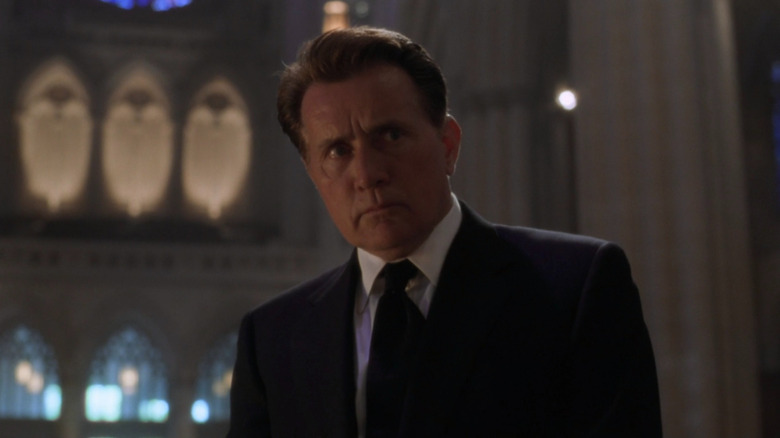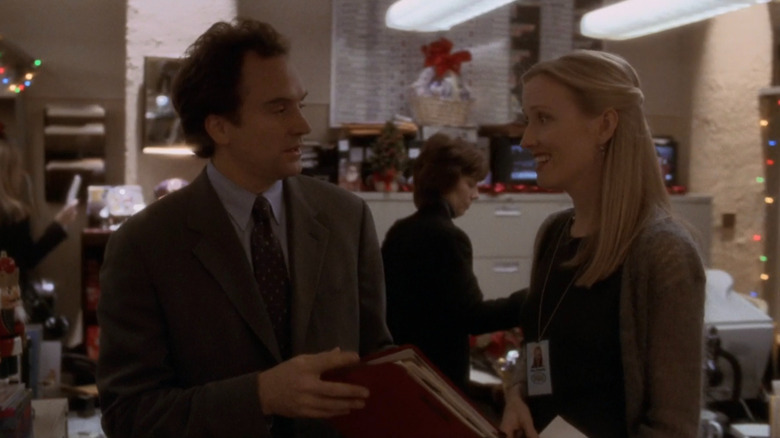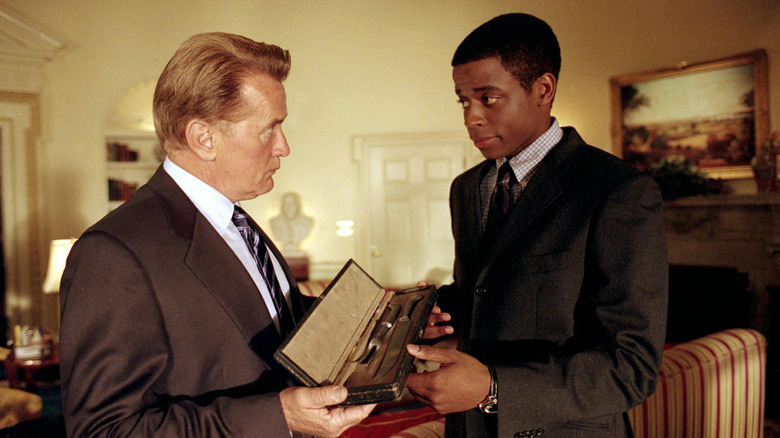The West Wing Happened 'Entirely By Accident,' According To Aaron Sorkin
When the COVID-19 pandemic first started, people suddenly had a tremendous amount of time on their hands to comb through their streaming subscriptions. This viewing manifested itself in two distinct ways. Either people retreated into the movies and television shows they have already watched countless times, or they saw this as an opportunity to watch all the stuff they had been meaning to watch for years but hadn't gotten around to. I found myself in the latter camp, and in a quest to watch something about political competency in a time when the country's leaders were anything but, I decided to watch Aaron Sorkin's "The West Wing" for the first time.
It was exactly the balm I needed. I know it's unrealistically idealistic about how government operates. I know it is a neoliberal fantasy. I know there are so many problematic things in it regarding race, gender, and religion. But in April 2020, it was perfect for my state of mind. I mainlined those first four seasons of the show incredibly quickly, tapping out during the Sorkin-less seasons. For those couple of weeks, my life was "The West Wing," and I was immensely grateful, and plenty of other people out there find comfort in this show, whether during the pandemic or watching it first-run.
Even though Aaron Sorkin has won so many awards and been apart of a ton of celebrated projects, "The West Wing" has become the ur text for the writer in a lot of ways, crystallizing his politics and worldview for better and worse. Amazingly, this was not one of those projects that he had wanted to make for years. It actually was just because of a misunderstanding and the suggestion of a friend that "The West Wing" came to be.
An Oscar-winning smoke session
1995 saw the release of "The American President," which reunited Aaron Sorkin with his "A Few Good Men" director Rob Reiner. It was clear at this point that Sorkin was going to be a household name. No one was writing dialogue like him, and in the 1990s, the ability to write smart, quippy dialogue was coveted. One of the people who approached him about his next project was John Wells, the executive producer of "ER." Speaking with Vanity Fair, Sorkin recalled how he believed he was just going to have a friendly lunch with Wells, and how a conversation with a future Oscar winner the night before got him out of a jam:
"My agent asked if I would like to have lunch with the television producer John Wells ... The night before the lunch, a couple of friends came over to my house for dinner, and one of those friends was the writer Akiva Goldsman. He'd not yet won the Oscar for writing 'A Beautiful Mind.' I had a little office in the basement. We snuck down to the office to have a cigarette, and there was a poster for a movie I had written, 'The American President,' on the wall. And I told him about the lunch I was having the next day with John Wells, and he said, 'Gee, you know what would make a good TV series? That.' And he pointed to 'The American President,' and he said, 'You know, if you forgot about the romance between the president and the lobbyist and kind of focused on the senior staff, that'd be a good series.'"
Sorkin had no intention of trying to get a TV gig; now, suddenly, the lunch was starting to look a lot like a pitch meeting.
The quickest deal
One year before "The West Wing" went on the air, Aaron Sorkin had another series premiere called "Sports Night." Considering how involved he likes to be in what he makes, you can imagine that "Sports Night" was where he focused his TV energy. So, he wasn't seeking to use this meeting with John Wells as a way to get a new project off the ground. However, when he arrived, he could see this was not just lunch with John Wells. At the table with Wells were a number of Warner Bros. television executives waiting to hear what the great Aaron Sorkin had for them, and he had nothing. So, he thought back to his conversation with Akiva Goldsman from the night before. Sorkin continued on to say:
"I sat down, and almost immediately, John said, 'So, what do you want to do?,' meaning what TV do I want to do. And instead of saying, 'I think that there's been a mistake. I don't have anything to pitch you. I really just came here for lunch,' I said, 'I want to do a show about senior staffers at the White House.' John reached across the table and said, 'You've got a deal.'"
Just from that lunch, Aaron Sorkin ended up having four years of his life completely devoted to this show that he had no intention of even pitching in the first place, and many of the other people involved in "The West Wing" were there for seven. Now, it has been over 16 years since the end of the show, and people are still desiring for the show to come back in some form, particularly in the last several years due to immense political upheaval. I guess you never know when opportunity will knock.


